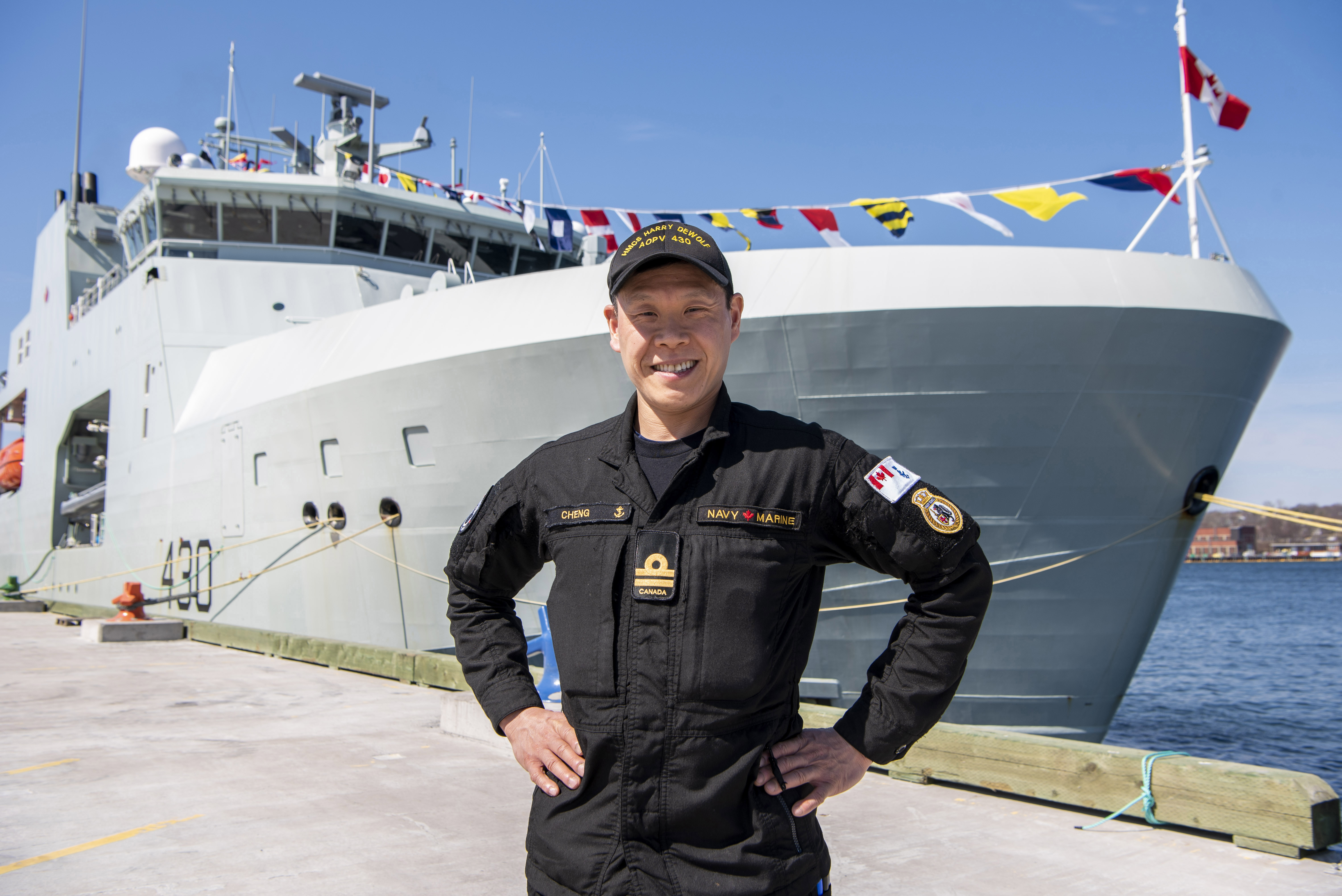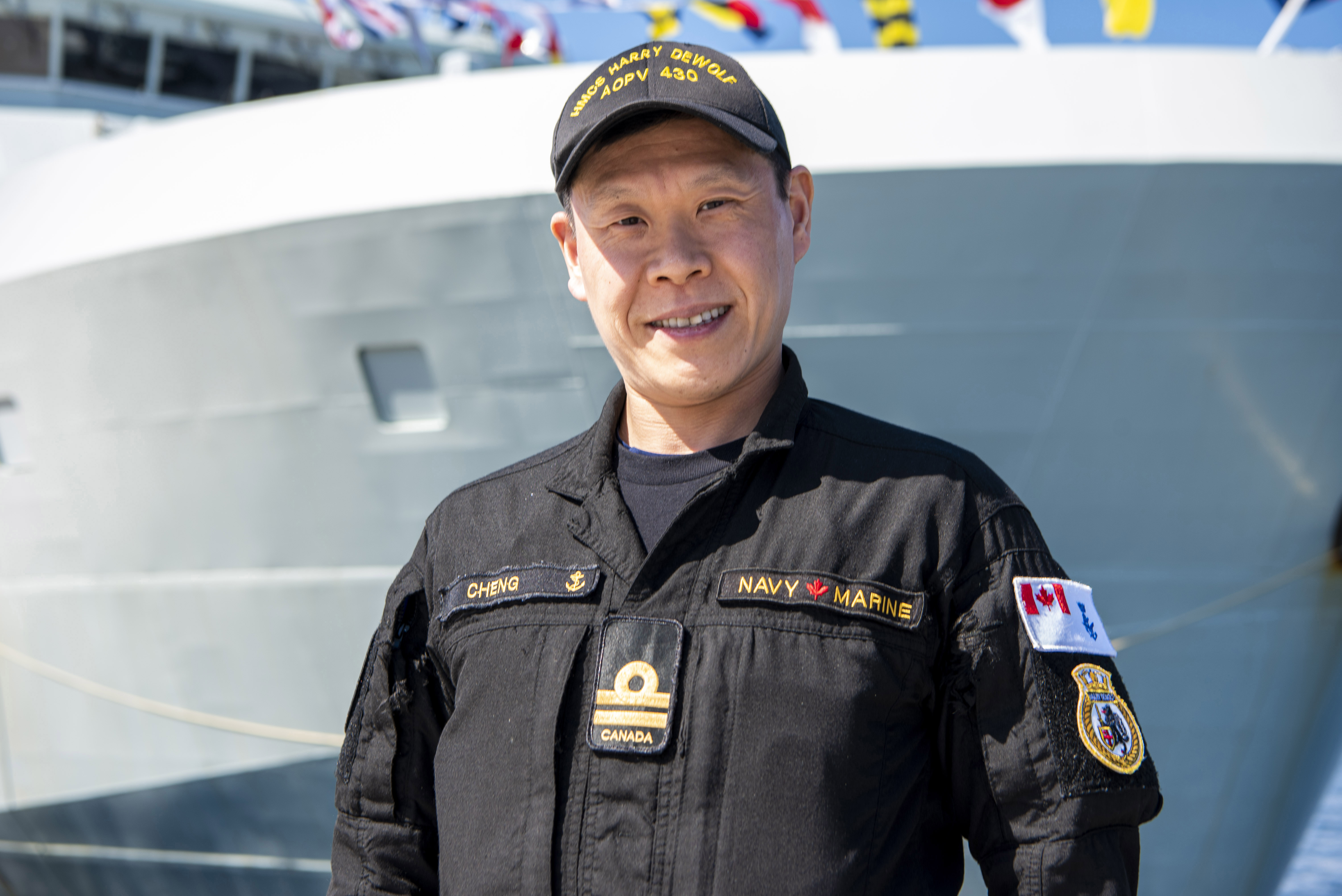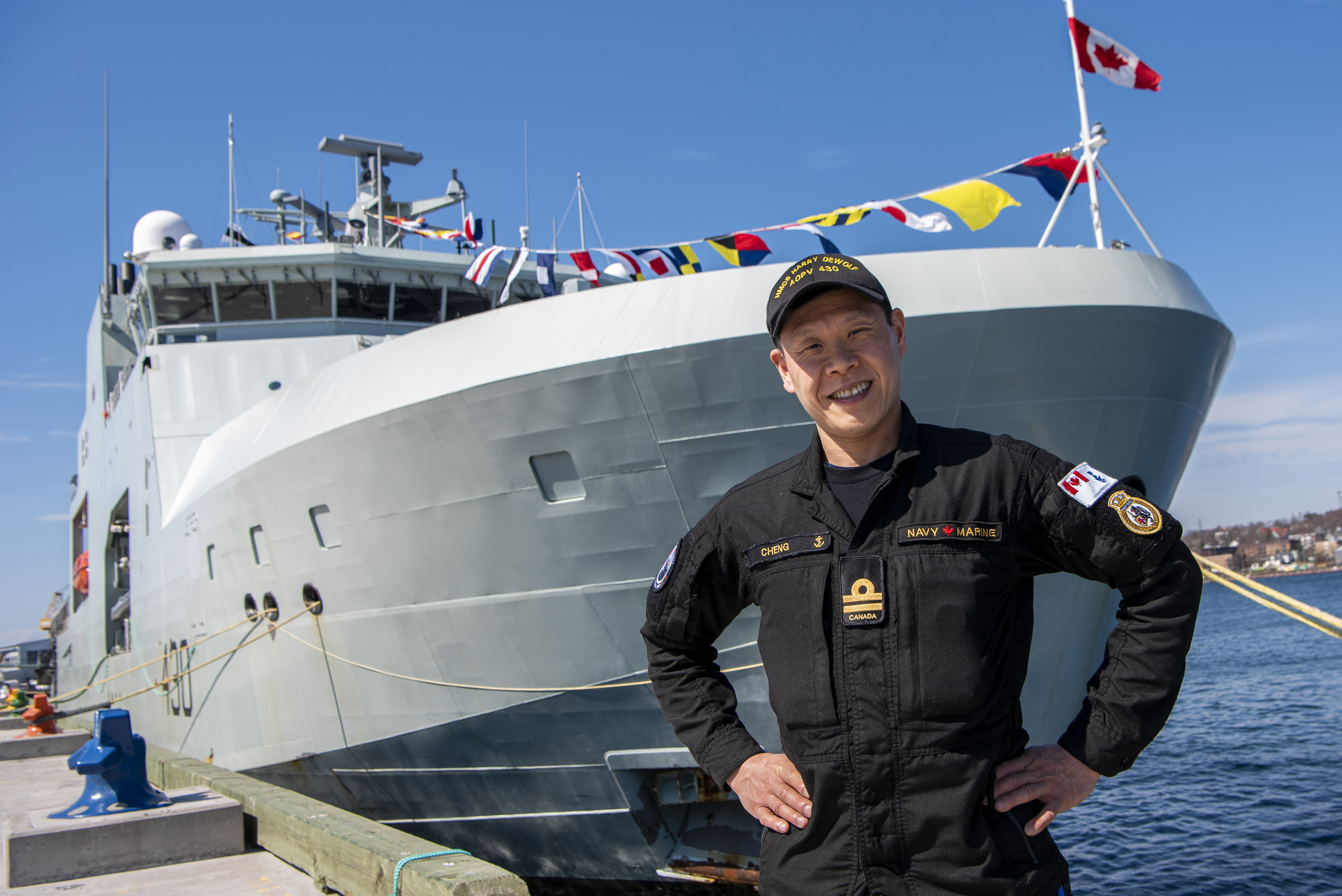Naval officer trades cruise ships for warships
Navy News / May 6, 2021
Lieutenant (Navy) (Lt(N)) Joe Cheng was 42 years old when he joined the Royal Canadian Navy (RCN).
While that might be considered a late career move for some, for Lt(N) Cheng it was a natural progression from a job he held for eight years as an officer aboard Holland America Line cruise ships.
“I think this is where my love of the seas came from, having acquired over 2,500 sea days with them,” he says. “I was also part of the team that brought out two different first-of-class vessels for Holland America Line.”
This experience came in handy when Lt(N) Cheng joined the crew of the RCN’s newest warship, Her Majesty’s Canadian Ship (HMCS) Harry DeWolf, where he is a bridge watch keeper.
He was one of the first aboard when Harry DeWolf was handed over to the Navy from shipbuilders in July 2020, first taking it out on a proficiency sail around Newfoundland and then proving its ice capabilities near Baffin Island earlier this year.
“The realization of being a part of and seeing the fruition of all our work was truly majestic,” he says. “It was iconic to see it sail under another Canadian icon of unity and connection, the Confederation Bridge in P.E.I., and a bigger highlight to be given the con on the bridge to do so.”
He adds that other highlights on that deployment included watching Harry DeWolf deftly handled in medium first-year ice; breaking through and stopping in an ice floe to watch a family of polar bears wander past ahead of the vessel; and seeing the Northern Lights appear over the ship in the evenings.
For a naval reservist whose home unit is HMCS Discovery in Vancouver, it was a long way from home.
But Lt(N) Cheng joined the RCN to serve and give back “to this amazing country.”
“Canada has given my family and I a beautiful home, great educations, amazing opportunities to be our best selves and live fantastic lives. I felt that the armed forces would be a good opportunity to give back.”
Along the way he has faced some challenges, but was able to overcome them by keeping an open mind and a positive, can-do attitude.
“As a reservist, one is constantly balancing their civilian employment, family needs and RCN training and readiness needs. Often these demands all peak at the same time andthis becomes increasingly difficult with requirements to go on course for several months at a time.”
After completing his Maritime Surface/Sub-Surface Operator and Naval Warfare Officer courses and qualifications, he was posted from the West Coast to Halifax.
“It was tremendously challenging and daunting to move to a new city, establish a brand new life and leave my home, family, girlfriend, dogs and an established career behind, along with the network and support of the community I’ve built up over four decades in British Columbia.”
He also had to leave his civilian job, knowing that it may no longer be there for him in the future.
A second challenge he encountered after joining the RCN was the tremendous learning curve, not only in knowledge, but also in culture and how business is done. But he found that listening to colleagues with an open mind, seeking advice and developing his own conclusions helped him move forward with confidence.
“I feel this is critical when we are bringing out a brand new class of ship with new technologies and new ways of doing things in an ever changing climate,” Lt(N) Cheng says. “The key to success I have found is getting a little better every day, not in big things, but in a series of little things that build habits.”
He says the best part of being in the RCN is the regular challenges every day brings, combined with the people he works with.
“Every person has their own story, capabilities and nuances, and we work with different teams all the time. Also, each day is slightly different and brings new and interesting challenges – even if it’s something we’ve done before many times.”
For example, he explains, a task such as cold moving a ship or leaving a berth is something that’s done numerous times, but every single time is different.
“Some of these variances can include weather, tides and elements, changes in locations or layouts. But the most exciting part remains the people – while it might be the 500th time we’ve done this, it could be the very first time a sailor is seeing it, and it is essential that we set that sailor up for success. This legacy of personnel, combined with that sense of awe of being a part of something bigger than just ourselves is to me the best part of the RCN.”
He recommends that anyone interested in joining the Navy, no matter what their age, do some research. Look at the different trades and their description carefully, talk to those people who have done it and have frank, candid conversations about the job, lifestyle, compensation and rewards.
“While there are many tangible rewards, many of the best rewards are intrinsic and are a reflection of what you, yourself, have put in and desire to accomplish in your own life. It’s important to make an informed decision and discuss it with your family and loved ones; they are as big a part of your support network as you are to them.”
He believes the Naval Reserve is a great way to start a career in the RCN or Canadian Armed Forces. While it’s normal to choose a trade prior to enrollment, starting out in the Reserves and completing basic training is a great way to learn about the Navy, the people and roles prior to fully committing to a trade and further training, while assessing time commitments and life balance requirements.
“I have found the sailors and leadership in the Naval Reserve to be exceptionally good and supportive in these capacities and the individuals are motivated to do well and assist each other to succeed.”
Lt(N) Cheng plans to stay in the RCN for the foreseeable future “for the simple reason that every day is an adventure.”
“I wake up each day feeling that I am contributing to something amazing. I truly believe in the importance of my job and root it firmly in the old saying, ‘Find a job you enjoy doing and you will never have to work a day in your life’.”


